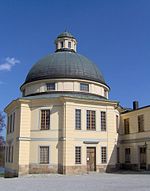St Ellen's Palace: Difference between revisions
No edit summary |
m (1 revision imported) |
Revision as of 04:28, 23 March 2019
| St Ellen's Palace | |
|---|---|
Naomh Léan Pálás | |
 Front view of the palace. | |
| General information | |
| Town or city | Spálgleann |
| Country | Glytter |
| Construction started | 16th century |
St Ellen's Palace (Ghaillish: Naomh Léan Pálás) is the principal residence of the monarchy of Glytter and members of the Glytteronian Royal Household. It is located in the Saint's Quarter of Spálgleann. It is one of Glytter's Royal Palaces and was originally built in the late 16th century. It served as a residence of the Glytteronian royal court for most of the 18th century. Apart from being the private residence of the Glytteronian royal family, the palace is a popular tourist attraction.
History
Royal residence
The Glytteronian royal families have used St Ellen's as their primary residence since its completion. The Palace has also been guarded by the Glytteronian Military in the same fashion as Spálgleann Palace.
The palace
The palace and its grounds have seen many renovations, changes and additions over the past 400 years. The largest renovation, in which electricity, heating, sewage, water lines were either installed or updated and the castle roof replaced, took place between 1907 and 1913. During a 20-year-period beginning around 1977, several major areas of the palace were restored and rebuilt. The library and national hall received much of the attention and fire protection was installed throughout the palace. In 1997, work began to clean and rebuild the exterior walls. This was completed in 2002.
The palace church
The palace theatre
The St Ellen's Palace Theatre is the opera house located at the palace. It is still in use, and its summer opera festivals are quite popular. At times the Royal Glytteronian Opera company guest performs.
The gardens
The gardens and park areas surrounding the castle and its buildings are one of the main attractions for the tourists that visit the palace each year.The gardens have been established in stages since the castle was built, resulting in different styles of parks and gardens






